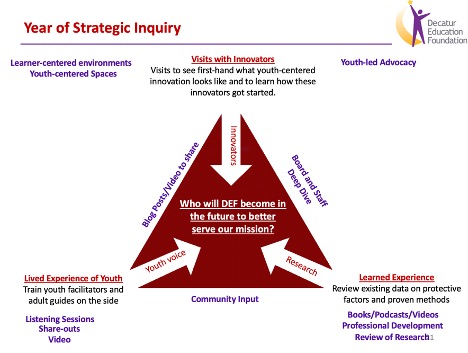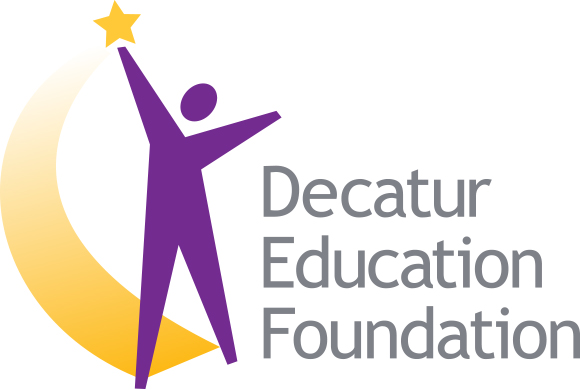
From Problems to Possibilities
Sometimes you read a book that really sticks with you and shifts the way you see the world. I am somewhat of a seeker, I look for podcasts, books and other resources that help me grow as a leader and as a person. Last year, with DEF’s 20th anniversary looming, I began to think about what the future held for this organization. I was completing my 12th year as executive director and felt proud of our community and all we had accomplished together. I also knew that it didn’t feel authentic to come out of the pandemic years and return to business as usual after so much disruption. Around that time, a board member suggested The Four Pivots, a book by Dr. Shawn Ginwright, that discusses some of the fundamental shifts that need to happen to achieve social change. I listened to the author on Brené Brown’s podcast and went on to read the book. Perhaps after reading this, you will want to do the same.
I found each of the pivots applicable to my work (and there will likely be more about this in future posts) and where we find ourselves at this moment but one that I kept going back to was the move from “problem-fixing” to “possibility-creating”. Dr. Ginwright analyzes how leaders and non-profits often get fixated – even addicted to– problems that we are trying to solve—and do not put enough thought into what should be created in their place.
DEF has been an organization defined by solutions. In fact, our mission is to connect people, resources and ideas to solve the problems facing our kids. In this moment, however, coming out of the pandemic, we have had to acknowledge the significant toll the pandemic has had on our kids and every part of their lives. There are so many problems to solve, it can feel like we are plugging leaks in a dam that was already at the brink of bursting.
The Four Pivots made me realize that in order for DEF to move boldly into the post-pandemic future and deepen our impact, we would need to move away from a focus on problems and toward a focus on possibilities.
This was the “aha” moment that prompted DEF to commit to a Year of Strategic Inquiry: taking time to shift our mindset to creating possibilities with and for our kids.
Typically, when faced with big changes or challenges, non-profits do strategic planning which usually involves surveying their constituents and using tools like a SWOT analysis (reviewing strengths, weaknesses, opportunities, and threats). I knew we needed something different, an approach that met this unique moment we find ourselves in and that acknowledges that we don’t have all the answers. We decided to fashion a process that was youth-centered, knowing there are no better experts on the experience of youth than the youth themselves.
We are anchoring our year by expanding our partnership with VOX ATL to train local youth facilitators and adult “guides on the side”. The youth, supported by adults, will design and host listening sessions with their peers to answer the question: What would help youth in Decatur feel connected, supported, and valued? What could (or should) be in place in Decatur that would help youth thrive? These questions reframe the traditional problem-focused work and allow youth to envision a future anchored in possibility. We learned from our pilot project with VOX ATL last spring that really listening to youth takes time and a willingness to let go of traditional notions of power and leadership, and we are ready to expand that work.
We will use the academic research, which is plentiful, to position what we hear from Decatur youth in the broader context of youth experience overall. The Search Institute’s Developmental Assets describe those characteristics that, when present, lead to better outcomes for youth. There is also a body of research on protective factors, things that help mitigate the risk factors facing our youth. Research like this helps us think about what we are trying to build as we re-frame the future and work towards a day when all children and youth have what they need to thrive.
The third part of this year is learning from experts in the field: organizations across the nation that center their missions on youth voice and leadership. I will be sharing what I learn from these visits, the first of which will begin this month. Rachel Wallack, Mission Director for VOX ATL will join me on a trip to visit the Neutral Zone in Ann Arbor where teens “lead, create, and innovate”. In November, I will travel to Seattle for visits with Gibson EK, a learner-centered education model, The Garage, a teen café and gathering space and Stonewall Youth, “a youth-led organization that empowers LGBTQ+ youth to speak for themselves, support each other, educate our communities, and work for social justice.” We are focusing our visits on three types of organizations: youth-centered spaces, learner-centered environments, and youth-led advocacy.
I don’t yet know where this year will take us, but I know that creating space to cultivate a culture of inquiry, curiosity, and listening will allow us to dream bigger and partner with Decatur youth to create a better future. I can’t wait to share what we learn! Check out some of the resources and innovators I plan to learn from HERE.
Stay tuned for my next post which will explore how one student in Massachusetts demonstrated a move from problem-fixing to possibility-creating when he started the first student-run high school.
